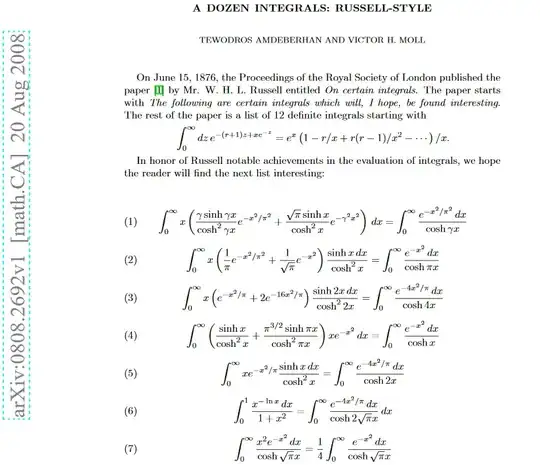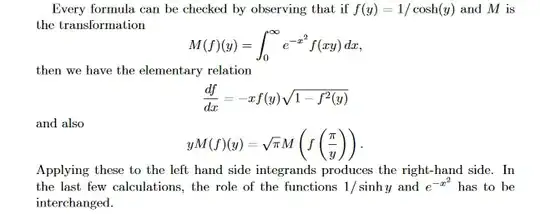This is a generous explanation of Lucia's comment above.
The functions
$$\mathcal H_n(x)=\frac{2^{1/4}}{(2^n n!)^{1/2}}H_n(\sqrt{2\pi}\; x) e^{-\pi x^2}$$
form an orthonormal system in $L^2(\textbf{R})$. Here $H_n(x)$ are the usual Hermite polynomials
defined by
$$e^{2xz-z^2}=\sum_{n=0}^\infty \frac{H_n(x)}{n!}z^n,\qquad |z|<\infty.$$
The functions are eigenfunctions for the usual Fourier transform
so that
$$\int_{-\infty}^{+\infty}\mathcal H_n(t)e^{-2\pi i x t}\,dt=(-i)^n \mathcal H_n(x).$$
It follows that $L^2(\textbf{R})$ is a direct sum of four subspaces. In each of these subspaces
the Fourier transform is just multiplication by $1$, $i$, $-1$, $-1$ respectively.
It is well known that the function $1/\cosh\pi x$ is invariant by the Fourier transform
$$\int_{-\infty}^{+\infty}\frac{e^{-2\pi i x\xi}}{\cosh\pi x}\,dx=
\frac{1}{\cosh\pi \xi}.$$
Therefore this function is in the span of the functions $\mathcal H_{4n}(x)$, and
therefore is orthogonal to any other eigenfunction. In particular
$$\int_{-\infty}^{+\infty}\frac{\mathcal H_2(x)}{\cosh\pi x}\,dx=0.$$
Since $H_2(x)=-2+4x^2$ it follows that
$$\int_{-\infty}^{+\infty}\frac{(8\pi x^2-2)e^{-\pi x^2}}{\cosh\pi x}\,dx=0.$$
Putting $x/\sqrt{\pi}$ instead of x
$$\int_{-\infty}^{+\infty}\frac{(8 x^2-2)e^{-x^2}}{\cosh\sqrt{\pi} x}\,\frac{dx}{\sqrt{\pi}}=0.$$
This is equivalent to your equation.

